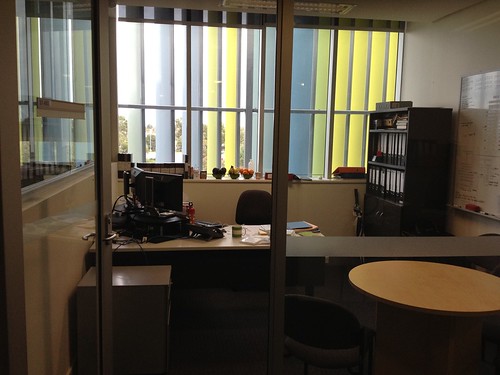Last week I spoke at an information session organised by the local chapter of our library association, ALIAWest. The session was aimed at “new grads” – individuals newly qualified as professional librarians, or currently studying librarianship – and we speakers were from academic or university libraries.
Not all of the readers of this blog are librarians, and perhaps some of the members of my family who read this blog may be interested in a snapshot of what I do every day, too, so I thought I’d post my talk here.
The organiser very kindly gave me a few questions to answer. Here I reproduce my notes:
What interested you in working in this particular library?
I’ve only ever wanted to work in a university library. When I think “library” I think of a university.
I think it is the idea that I can, in some small way, contribute to the creation of new knowledge, whether it is by supporting students, or researchers, that appeals to me.
I also like the ideals of a university. For instance, where I work, ECU, our Mission is:
To further develop valued citizens for the benefit of Western Australia and beyond, through teaching and research inspired by engagement and partnerships.
Our Vision: For our staff, students and graduates to be highly regarded as ethical and self-reliant contributors to more prosperous, inclusive and sustainable communities.
We Value
Integrity: behaving ethically and pursuing rigorous intellectual positions.
Respect: valuing individual differences and diversity.
Rational Inquiry: motivated by evidence and reasoning.
Personal Excellence: striving to realise potential.
I remember having a discussion with my Dad about what I would do when I finished university – he wanted me to go into business, or do something to get rich, but the idea of working for a for-profit organisation completely did not appeal to me. He did suggest, gently, that I was too idealistic – perhaps I am!
What are your clients are like, and what specialised services do you provide to them?
ECU is one of the newest universities in the country (we only became a uni about 20 years ago). We have a strong focus on undergraduate teaching and on providing alternative entry options for students. I’d say that our focus on information literacy and the sorts of services we currently provide are quite typical of services provided by other Australian university libraries. We are starting to develop services to support researchers.
I think we are coming to recognise that our services are very traditional and in some cases we don’t actually know what our clients actually want or need in this fast-changing environment – we’re going to have to do some work to find out…
Give us a brief ‘day in the life’ at work covering your typical tasks:
I found it quite hard to write about a typical day, as my days can vary significantly depending on the time of year.
I manage three teams:
- Acquisitions and subscriptions [we buy the books, journals and other material that our clients need, both in paper, and increasingly, electronically]
- Library Systems [the Library Management System, including the Library Catalogue, discovery layer, and website]
- Research services [a new area for us. We started last year by describing research datasets created by our researchers.]
Approximately 20 staff – library technicians and librarians.
A view of my office.
Tasks I do regularly:
- Work with the three managers who report to me – reviewing processes, policies, projects and planning
- Lead projects – this year for instance I have reviewed our Document Delivery service, Key Performance Indicators, and a range of deselection projects. Also working on streamlining our acquisitions processes.
- Write reports
- Manage acquisitions budget
- Oversee staffing issues and recruitment for my areas of responsibility. In recent times I’ve had to rewrite our Position Descriptions for library staff across a number of levels
- Respond to email from academic staff and postgraduate students – I am the copyright contact so receive a lot of copyright queries
- Respond to email from vendors and suppliers
- Respond to all other email
- Chair meetings – collection development, Occupational Safety and Health, other meetings as required
- Attend meetings – uni-level and as the University Librarian’s proxy
- Represent the library in local consortium and nationally
- Provide information as requested by the UL (my PD actually specifies that I “analyse international and national trends and provide strategic advice and information to the UL and key stakeholders”)
- As part of library executive, strategic and operational planning
Oh, and you might be interested in my potted biography, written up on the spur of the moment for the organisers. I was trying to summarise how I got to this role and the changes that I’ve seen in the library since I started:
Constance Wiebrands has worked in university libraries since 2000. In 2000, CD-ROM databases were still important, people needed a lot of help navigating the Web, and some complained about the use of email on library computers as “non-academic” (and therefore should be banned). There has been a lot of change in academic libraries in this past decade! Con began as a reference librarian, teaching EndNote and information literacy. She took on her first supervisory role in 2003, and became a manager in 2007. While the majority of her work in libraries has been in the client services area, this year Con took on a management role in the bibliographic services/acquisitions area, in the never-ending quest to become a more well-rounded librarian.
I like my job, despite its challenges: dealing with personalities, conflicting priorities, limited budgets, professional culture for all its richness and quirks, and not least the changing role of libraries in the currently rapidly evolving information environment.

One Comment
Thanks so much for sharing, Con! I see myself working in a university library one day. I believe the appeal in contributing to the generation of new knowledge is what drives me as well.